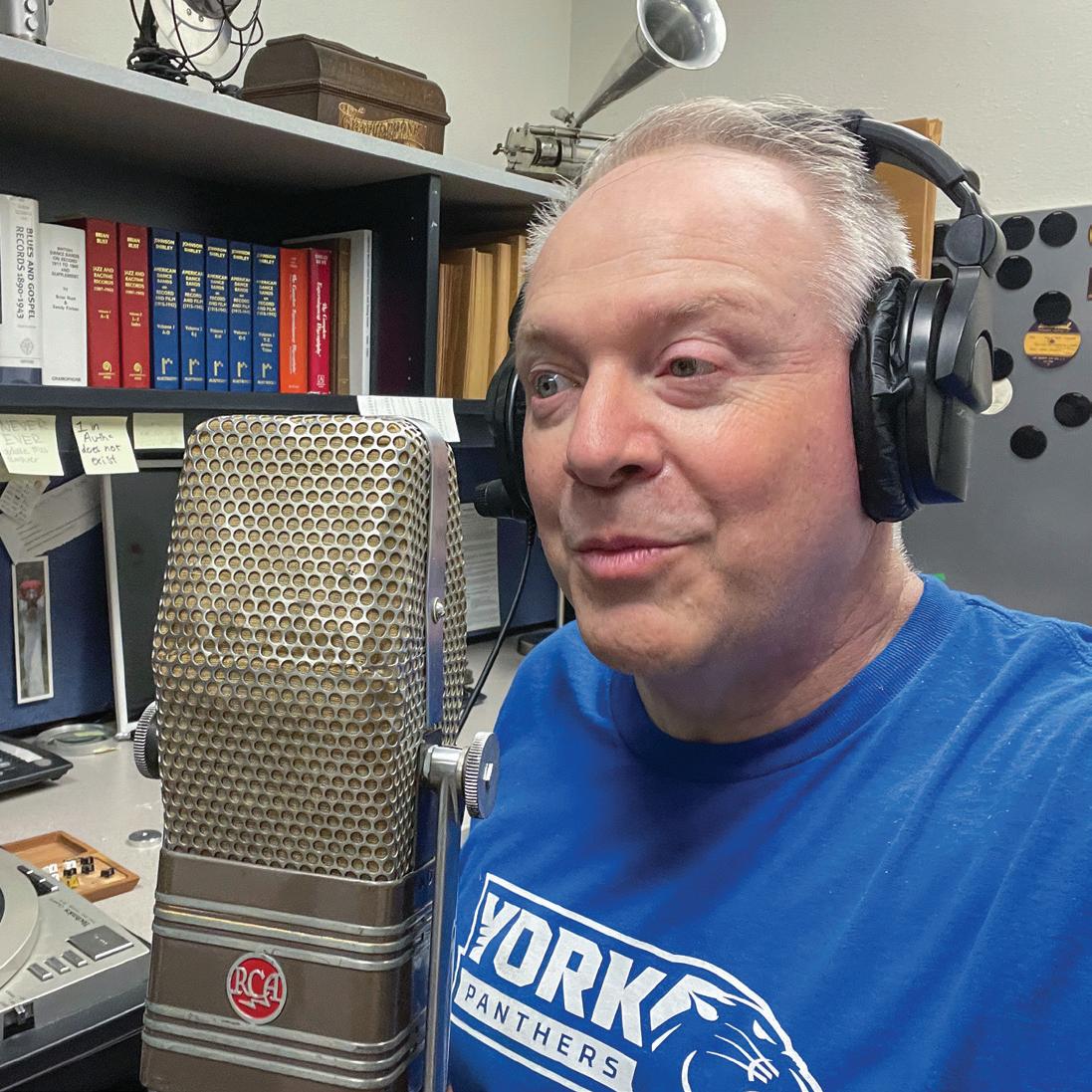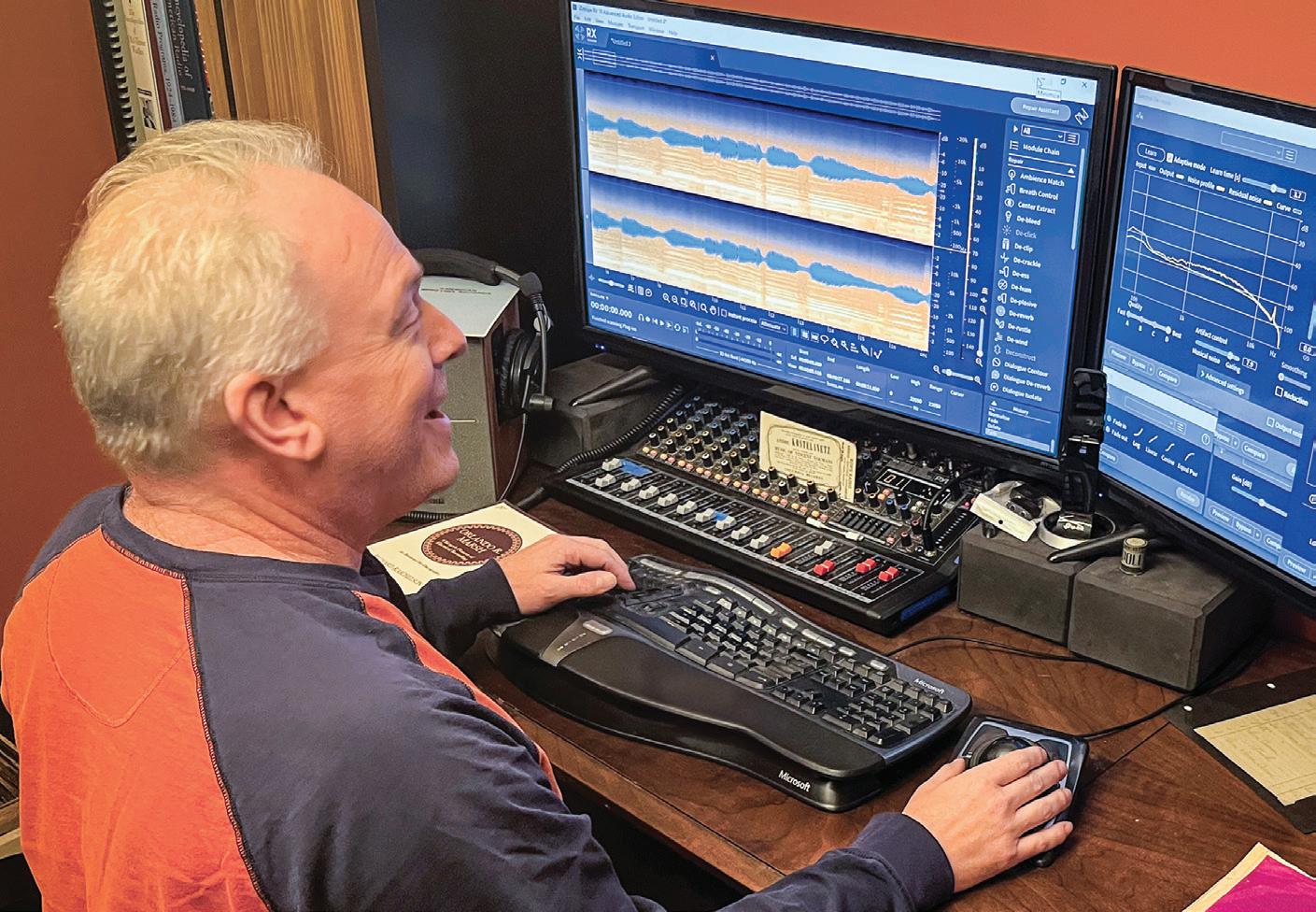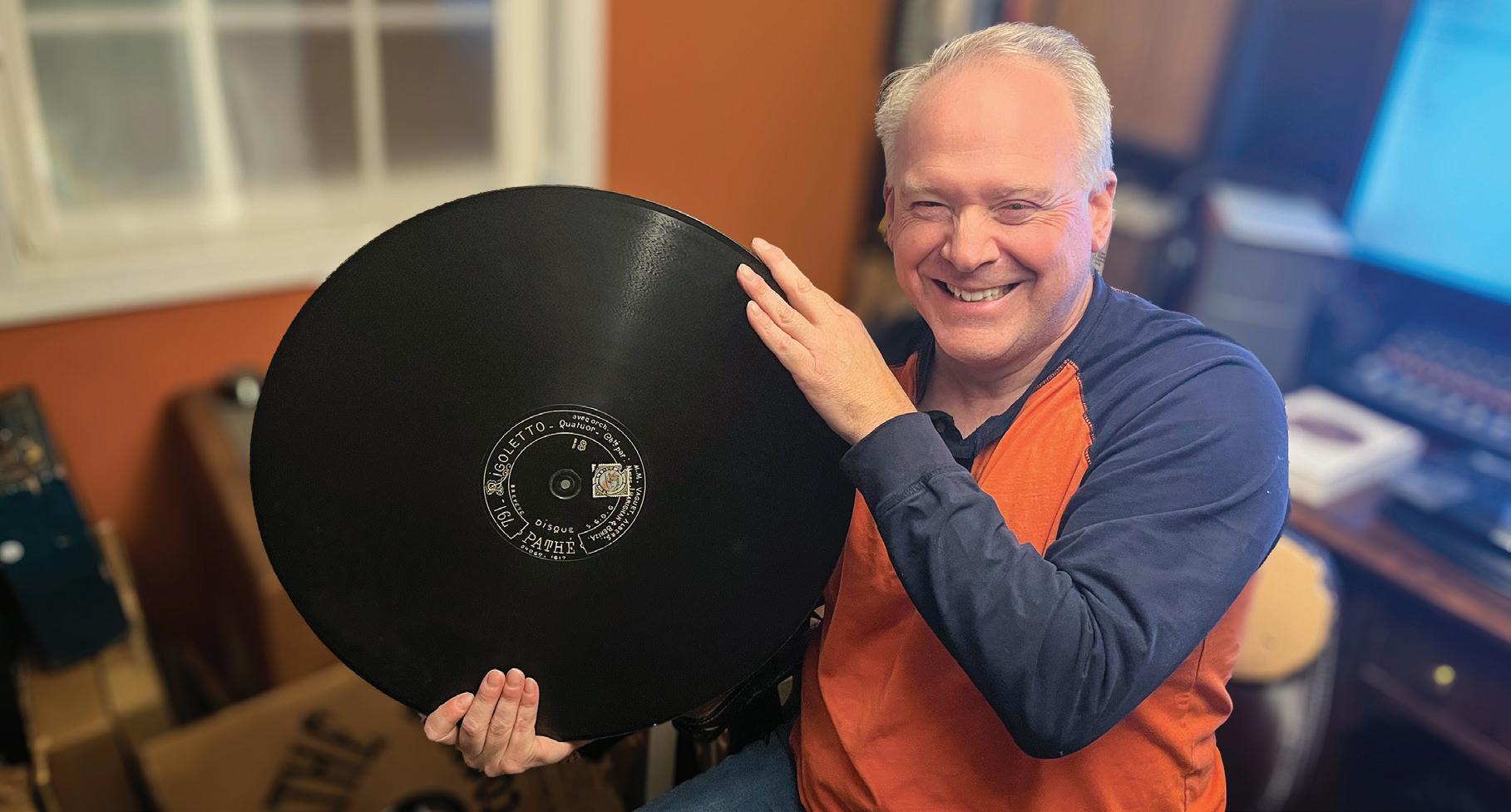
12 minute read
THE JOY OF DISCOVERY
from Heritage 52
BY STEDDON SIKES '84
Has it ever been your dream to live in the woods away from the hustle and bustle of life? What if a mountain were thrown into the mix — one that has a beautiful view, that has a stream meandering near the property, and door-to-door salesmen never make a house call? Would it be worth it to you if your cell phone struggled to get a signal and you had to drive to the nearest town to get your mail?
Tucked away in the hills of Eastern Tennessee, Mark Atnip ’92 is living the dream. His mountainside home is off the beaten path, away from civilization as most of us know it. But he and his pet Birdie Pants, a rare white-capped pionus parrot, seem well-adapted to their reclusive lifestyle and content with dinner for two.
Even though Atnip might post the occasional “no-trespassing” sign on his property or even on his social media accounts, the guy really does enjoy his life and the many interactions he has with those who have similar hobbies, interests, and the various connoisseurs of rare audio recordings. There’s more to say about that in a minute, but for now, let’s slip back a few years.
Despite the opportunity to sign as a semipro pitcher out of high school in 1988, Atnip made the choice instead to play at York College. He had never been on campus before, but liked the idea of a small Christian college and being involved in multiple activities and groups. Along with baseball, he jumped into the college experience with both feet, joining Sig Tau social club, York Chorus, and making the traveling skit group Soul Concern. He served as an RA, assistant dorm supervisor, assisted with the women’s volleyball program, and logged countless stage hours in plays and musicals.
When Dr. Cornell Bonde ’91 saw a picture I posted of my visit with Mark on Facebook, he stopped by my office that same week to hear firsthand how he was doing. Bonde and Atnip were contemporaries on stage and competed against each other in intramurals. He made the comment that Mark was an all-around good guy and that he was indeed a good athlete and entertaining as a pitcher. “He had a solid arm. When he threw a ball, he could make that ball dance. He was fun to watch.”
As a junior, Atnip became a unique part of the college’s history, joining four other students, Jerry Morgan ’91, Eric Tremaine ’91, Donna (Busch ’92) Embray, and John Hayden ’92 in pursuit of bachelor degrees in Bible, the first since 1959.
Atnip credited the time he spent with Dr. Clark Roush in the chorus and in a conducting class he taught as the most formative to his current career of being a rare audio archivist.
“My education on how to listen to music and how to appreciate it was Dr. Roush. End of list; absolute end of list!” Atnip stated emphatically. “The exposure to different musical styles and the technical aspects of music have undoubtedly shaped my ear and understanding of recorded sound.”
Atnip went on to pursue a masters in music history and literature at both Texas Tech and the University of Minnesota, further solidifying this foundation and appreciation of music. He attempted being a youth minister for several congregations, but it didn’t take, or as Atnip put it, “As you can see, I like to be alone."
While living in Minnesota, Atnip tried his hand at playing hockey, and in his words, “enjoyed it way too much.” He got to the point where he was one of the better amateur goalies in the region and even signed with the Knoxville Ice bears, an inaugural charter member of the Southern Professional Hockey League (SPHL), for a stint as a backup goalie. Moving back to his home state of Tennessee, he started broadcasting for SPHL teams and eventually became the voice of the Ice Bears. For eleven years, he provided play-by-play for every road game and public address for home games, serving as the organization’s director of media and communications.


Atnip emphasized the complexities of hockey broadcasting, “I'll tell you right now, if you can do hockey, you can do any other sport."
He was the broadcast voice of the Knoxville Force MPSL soccer team, beginning with their inaugural season of 2011. He hosted or co-hosted several sports talk programs in the Southeast including: Just Another Sports Show, Out of Bounds at ESPN Radio, Prime Time Sports, The Breakfast Team, Coverboys program, and at one time produced the Dixie Angler, a nationally syndicated, award-winning outdoors program. He has also voiced over 300 national, regional, and local commercials.
However, none of these intriguing activities, attributes, and accomplishments summoned me to Mark Atnip’s home in the woods for an interview this past February. Interesting and colorful — certainly, but these were bonus soundbites volunteered in our lengthy conversation. It was his alumni update from the Fall 2022 Heritage magazine that resurfaced in my mind and beckoned me to see what he was up to.
1992 Mark Alan Atnip is a semi-retired Audio Archivist for the Library of Congress, Smithsonian, etc., specializing in archival audio formats and digital audio restoration. He shares, “Currently I work with some of the rarest and most valuable audio in the world, creating archival copies of audio recordings that exist only in unique (or close to it) examples.”
I remember thinking, “What’s that all about?” What exactly is an audio archivist? How rare of audio and how valuable? How close are his ties with the Library of Congress and the Smithsonian?
This part of Mark’s story has at its very roots his childhood memories of receiving 78 RPM records from his granddad and listening to them countless times, the profound impact Dr. Roush had on his understanding and appreciation of music, mixed with the love he has for baseball.
Back in the ’90s, Atnip walked into a Minnesota record shop because a friend wanted to look for modern jazz records. Atnip had no interest in modern jazz but did his own browsing and stumbled upon a 1908 copy of Take Me Out to the Ball Game. “I'm thinking this is cool, and so I started looking around. You got any more baseball records?” he asked the cashier. “And I ended up buying like a dozen baseball records.”
After years of purchasing these recordings, ranging from songs to marches related to specific teams and players, Atnip wants to compare what he has with what is available. To his surprise, he can’t find an exhaustive list of these recordings, which spurred him on to create his own comprehensive database of all the 78 and cylinder baseball records he could find.
“I contacted the Baseball Hall of Fame National Archives, Smithsonian, Library of Congress… you know, all the people who are now my friends, to see if they have any I don't have—so I can add those,” he said with a wry smile. “What I discovered is that my collection was way more advanced than theirs! After I put all of theirs together and removed the duplicates, they had 128 different baseball recordings that were either on 78 or cylinder. At that point, I had almost 200!”
If that wasn’t impressive enough, Atnip whips his chair around, pulls up his current collection that is catalogued on his computer and says, “Now we [Atnip and Birdie Pants] have all sorts of database stuff. Let’s find out… we have 856.”
Atnip points behind me at a 4’ x 5’ bookshelf that has 12 filled cubbies.
“And there they are — the largest group of baseball records in the world.”
Impressive, right? I’m sitting in a bedroom/studio in Mark Atnip’s house, staring at the world’s largest collection of 78 RPM and cylinder baseball records.
In a word, “Wow!”
But that was only one of his bookshelves.
Baseball record collecting opened a whole new world for Atnip; discovery and preservation of rare audio recordings. With his educational background in music and appreciation for various genres, Atnip started looking for those “one-of-a-kind” treasures, particularly in jazz and early blues, making a high-quality digital recording of the record.
Atnip’s eyes sparkled as he relished the moment, “My favorite thing to do is find a record that's either previously unknown or that it's the only copy that exists. If it's a jazz record, I can get that recording into the hands of jazz musicians. And then those jazz musicians will be like, 'This is a record we've never heard!' And next thing you know, it's on somebody's album!

“For instance, there's a great band out of New York, Vince Giordano and the Nighthawks. I found a test pressing recently of the song Early to Bed handwritten on the label. It was kind of catchy and peppy and I ended up giving that to Vince Giordano so he could basically write it out, convert it into sheet music, and play it. It’s sweet. I mean that's the joy of finding and owning those records. Someone will say, ‘You should sell it.’ And I'm like, but then I wouldn't have it. I can say Vince Giordano found this song from this exact record and that record is sitting there, you know, and I like it.”
Like a kid in a candy shop, I can tell Atnip is in his element and doesn’t plan to stop any time soon. I probe a little, asking if jazz is his favorite type of music to collect.
“Right now, I'm working on something for myself — gospel, which is good because in this part of the country it's easier to find… in particular, bluegrass gospel, you know, early early black gospel. There's so much good material in these hills around here, rare stuff that you'll never find in a city.”
Then Atnip added something I didn’t expect: “…and early recorded sermons.”
“Really?” I asked.
“You should hear some of these sermons that were recorded and released as records,” he chuckled. “First of all, every sermon should fit on a record, and by record, I mean a 78 ‘cause you've got three and a half minutes a side… so you're talking seven minutes tops.
“Some of them are hilarious. Here’s a sermon by Reverend J.M. Gates called Women Spend Too Much Money. It's a three-minute sermon on women overspending on shoes, hose, and underwear. And the women in the audience say amen! But the greatest recorded sermon ever is Reverend A.W. Nix, Black Diamond Express to Hell.”
Atnip pauses to play a digital recording he’s made of his 192728 record that begins: “I take my text this morning in Matthew 7 chapter and 13th verse: ‘Enter ye in at the strait gate: for wide is the gate and broad is the way that leadeth to destruction, and many there be that go in therein.’ This train is known as the Black Diamond Express Train to hell. Sin is the engineer, pleasure is the headlight, and the devil is the conductor.”
After listening for a minute or two, Atnip said, “I think it would be fun to take a lot of this early black gospel, these early black sermons, and put together a presentation. It would be fascinating.”
I point to a larger than normal record on display in his studio and ask Mark about it.
“That’s a particularly cool find,” he said. “It’s a 16-inch Marsh Laboratory radio transcription disc from 1932. According to existing research, no physical copies of records from this specific matrix series were ever known to exist. I discovered it in the basement of a radio station within a larger collection. It's a 15-minute religious radio show featuring hymns and readings by Homer Rodeheaver. The record is not only the only known copy from that Marsh series but also came with its original factory sleeve and needle envelope, making it an incredibly rare piece of recording history.”
Atnip’s deep fascination with the history and stories behind his records fuels his desire to keep them and makes them personally valuable beyond their market price. This sense of purpose and collaboration is a key component to his passion, affording him the opportunity to engage in research, connect with other enthusiasts, and potentially contribute to a greater understanding of music history. Besides working with institutions such as Stanford, UC Santa Barbara, Yale, the National Archives, the Smithsonian, and the Library of Congress, Atnip also participates in the Association for Recorded Sound Collections (ARSC) conferences, interacting with prominent archivists and music librarians.
“We’re a bunch of research nerds,” Atnip said with a laugh. “Things that the people in New York get paid for, we do it for free."
Atnip hopes to visit campus soon and give a presentation on the rarest gospel music and sermon recordings in the world, playing samples of his collection for YU students. What began as a happenstance visit to a record store all those years ago, has turned into a career of finding that pearl of great price and sharing it with the world.






